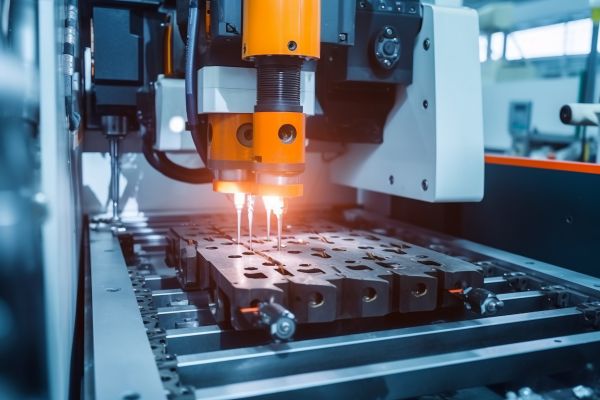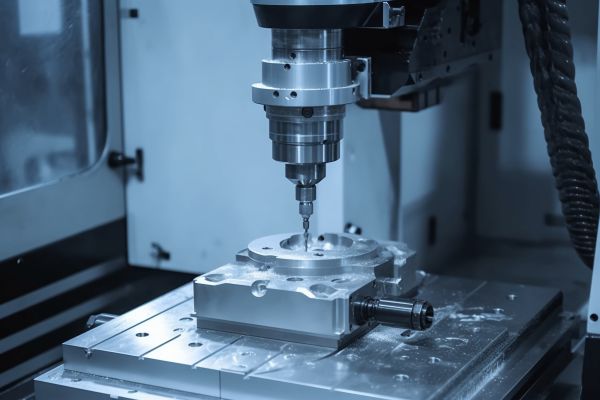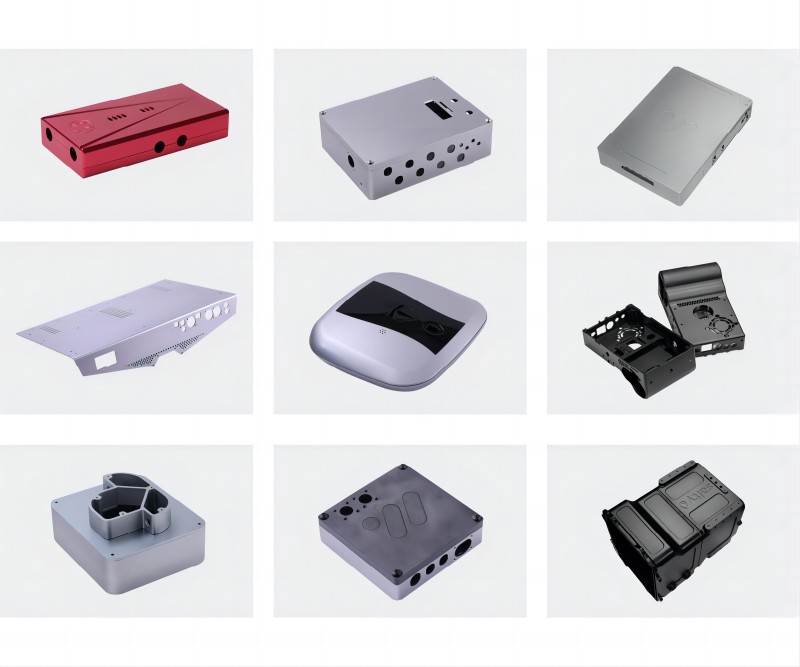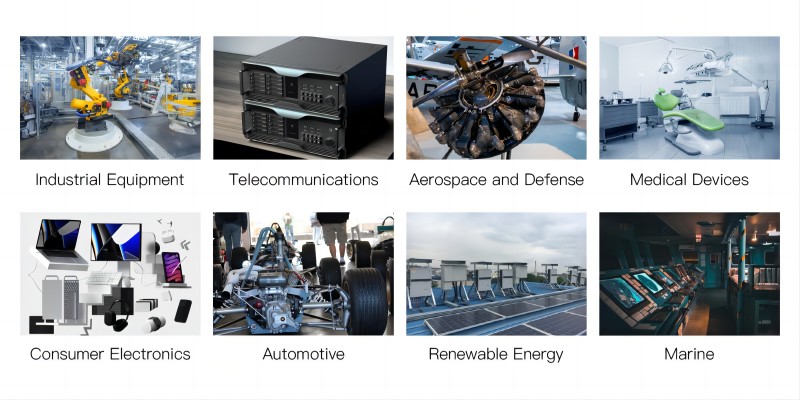Custom manufacturing of aluminum chassis enclosures can involve several different processes, each with its own benefits and suitable applications.
1. CNC Machining
Using computer numerical control (CNC) machines like milling and turning to remove material from a solid block of aluminum to achieve the desired shape and dimensions.
2. Die Casting
Injecting molten aluminum into a steel mold under high pressure, then cooling and solidifying it to form the part.
3. Sheet Metal Forming
Cutting, bending, stamping, and welding aluminum sheets to form the desired enclosure shape.
4. Extrusion
Forcing heated aluminum through a die to create long pieces with a consistent cross-sectional profile, which are then cut and further processed as needed.
5. Casting
Pouring molten aluminum into a mold and allowing it to cool and solidify, followed by machining and finishing.
6. Powder Metallurgy
Compressing aluminum alloy powder into a shape, then sintering it at high temperatures to create a dense, solid part.
7. 3D Printing (Additive Manufacturing)
Building parts layer by layer using selective laser melting (SLM) or electron beam melting (EBM) techniques.

The choice of custom manufacturing method for aluminum chassis enclosures depends on production volume, design complexity, cost considerations, and specific application requirements. CNC machining is ideal for high-precision and custom designs, die casting and sheet metal forming are suitable for high-volume production, while 3D printing offers unmatched design freedom and rapid prototyping capabilities. Selecting the most appropriate manufacturing process is crucial for ensuring product quality and cost-effectiveness.
YMP focuses on high-precision CNC machining aluminum enclosure customization for more than twenty years, the following focuses on the process of CNC machining of aluminum chassis enclosure and its advantages and applications.
Manufacturing Processes
1. CNC Milling:
Process: Uses rotary cutters to remove material from a workpiece, creating complex shapes and fine details.
Advantages: High precision, suitable for complex geometries, and tight tolerances.
2. CNC Turning:
Process: The workpiece rotates while a cutting tool removes material, ideal for cylindrical parts.
Advantages: High accuracy for round shapes, efficient for producing symmetrical parts.
3. Drilling and Tapping:
Process: Creating holes and threading them for screws or bolts.
Advantages: Precise hole placement and consistency, essential for mounting components.
4. Multi-Axis Machining:
Process:** Uses CNC machines that operate on multiple axes (e.g., 3, 4, 5-axis machines) to create complex shapes in one setup.
Advantages:** Enhanced flexibility, reduced need for multiple setups, and ability to machine intricate designs.
5. EDM (Electrical Discharge Machining):**
Process: Uses electrical discharges to remove material, especially useful for hard-to-machine shapes.
Advantages: High precision for intricate details, works well with complex geometries.

High Tolerance Levels:CNC machining can achieve very tight tolerances, ensuring parts meet precise specifications.
Consistency: Provides high repeatability, ensuring that each enclosure is identical to the design.
Complex Geometries: Capable of producing complex shapes and intricate designs that might be challenging with other manufacturing processes.
Customization: Easily accommodates design changes and custom features, making it ideal for prototyping and low-volume production runs.
High-Quality Finish: CNC machining can produce a smooth surface finish, which can be further enhanced with anodizing, polishing, or painting.
Post-Processing Options: Allows for a variety of surface treatments, improving both aesthetics and functionality.
Speed: CNC machines can operate continuously and produce parts quickly once the initial setup is completed.
Automation: High level of automation reduces the risk of human error and ensures consistent quality.
Waste Reduction: CNC machining can be optimized to minimize material waste, which is both cost-effective and environmentally friendly.
Recyclability: Aluminum scrap generated during machining can be recycled, adding to the sustainability of the process.
Tooling Costs: Lower initial tooling costs compared to processes like die-casting or injection molding, making it cost-effective for small to medium production runs.
Setup Flexibility: Rapid setup changes allow for efficient switching between different designs or production batches.
EMI/RFI Shielding: Aluminum provides natural shielding against electromagnetic interference (EMI) and radio frequency interference (RFI), protecting sensitive electronic components.
Weight-to-Strength Ratio: Aluminum offers a good balance between weight and strength, making it suitable for applications where weight is a concern.
Rapid Prototyping: CNC machining is ideal for creating prototypes quickly, allowing for rapid design iterations and testing.
Low Volume Production: Efficiently handles low-volume production runs without the need for extensive tooling or setup.
Multi-Axis Machining: Capabilities of multi-axis CNC machines allow for complex and detailed work on multiple sides of the enclosure in a single setup.
Variety of Features: Can integrate various features like threaded holes, mounting points, and complex internal geometries directly into the enclosure design.

Strength and Durability: Aluminum offers excellent strength-to-weight ratio, making it strong yet lightweight.
Thermal Conductivity: Efficient heat dissipation is crucial for electronic enclosures, preventing overheating.
Corrosion Resistance: Naturally resistant to corrosion, further enhanced with anodizing or coatings.
EMI/RFI Shielding: Provides effective shielding against electromagnetic and radio frequency interference.
Machinability: Aluminum is relatively easy to machine, which reduces manufacturing time and costs.
Enclosures for control panels, machinery housings, and automation systems.
Housings for networking equipment, servers, and communication devices.
Protective enclosures for medical equipment and instrumentation.
Durable enclosures for avionics, radar systems, and military electronics.
Custom cases for high-end audio equipment, gaming consoles, and home automation systems.
Enclosures for automotive electronics, such as ECU housings and sensor covers.
Housings for solar inverters, battery storage systems, and wind turbine controllers.
Enclosures for navigation systems, communication equipment, and other marine electronics.

Custom machining of aluminum chassis enclosures leverages the precision and versatility of CNC processes to produce high-quality, durable, and precisely tailored enclosures for a wide range of applications. The material properties of aluminum, combined with the advantages of CNC machining, make it an excellent choice for industries that demand high performance, reliability, and customizability.YMP can provide high quality and high precision customized CNC machining service for aluminum chassis enclosure.